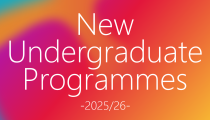
Sept 2025 Entry
What's New
The School of Optometry is one of the five academic units in the Faculty of Health and Social Sciences and is a research hub in Optometry with international recognition. The School focuses on two research areas, namely myopia and the ageing eye. The aim of our myopia research is to unravel the cellular mechanism of myopia and develop clinical interventions to prevent and halt its development and progression. Our ageing eye research focuses on understanding the physiological ageing processes leading to vision loss and the pathogenesis of age-related eye diseases including glaucoma, diabetic retinopathy and retinal degeneration.
The School invites high calibre students with evidence of academic excellence, research ability and good communication skills to apply for Doctor of Philosophy (PhD) and Master of Philosophy (MPhil) studies.
Please visit our website for more information about our research areas and programmes.
Ageing Eye Research
As people age, visual function often deteriorates and the risk of eye disorders and pathologies increases. Our goal is to find better ways to manage such eye conditions to preserve vision and independence. We are carrying out research in the following areas:
Dry eye and tear physiology
Glaucoma and aqueous humour dynamics
Ocular biomechanics
Retinal degeneration
Please click here to learn more about the research interests of our School of Optometry and contact our staff directly to discuss research opportunities.
Myopia Research
Myopia affects the majority of children in Hong Kong. It impacts on their quality of life and increases the risk of vision loss in later life. We are carrying out research to discover why myopia develops, ways to retard its development and approaches to minimise its impact on public health. To achieve this goal, staff members are undertaking research in the following areas:
Animal models
Clinical trials
Epidemiology
Genetics
Proteomics
Public health
Visual electrophysiology
Please click here to learn more about the research interests of our School of Optometry and contact our staff directly to discuss research opportunities.
Centre for Myopia Research
The Centre for Myopia Research conducts clinical, genomic and proteomic research using a multi-disciplinary approach, pulling in expertise from all areas of clinical and basic science. In the past few years, the Centre’s researchers have made significant discoveries in myopia control strategies such as novel lens designs and overnight corneal remodelling therapy. These results have led to further downstream developments and applications.
Optometry Research Clinic
The School established the Optometry Research Clinic in 2013 and it was brought into full operation for translational and clinical research in 2016. Four cubicles are equipped with standard sets of optometry equipment, and the remaining four cubicles are furnished with specialised instruments for optometry research related to advanced ophthalmic imaging of anterior and posterior eye segments; ocular motility and visual functions; dry eye and contact lenses; and advanced ophthalmic dispensing.
Other Major Research Facilities
Apart from the Centre for Myopia Research and the Optometry Research Clinic, the School has set up various laboratories such as the Visual Neuroscience Laboratory, Future Optometry Laboratory and Ocular Anatomy Laboratory, to expand the frontiers of our research.
Interested students are encouraged to approach our faculty members (click here for the list of staff) to discuss their research proposals.
Please address your enquiries to Departmental Research Committee Secretary (email: so.rpg@polyu.edu.hk).
Compulsory - Two Academic Referee's Reports are required.
• Identify and invite two academics who are familiar with your academic performance and achievements. Proposed supervisor(s) from the PolyU, proposed supervisor(s) from the partner institution (if any), and persons from non-academic backgrounds are not considered appropriate academic referees.
• Provide complete and accurate information on your referees, including their email addresses under a university or an organisation, in your online application.
Compulsory
Compulsory - A standard form must be used for the submission of research proposal. Please click here to download the form.
Compulsory – Please upload all academic qualifications including Bachelor’s degree and Master’s degree (if any) according to the University’s admission requirements, also refer to the ‘Procedures – Guidelines for Submitting Supporting Documents’ to follow the submission requirements.





